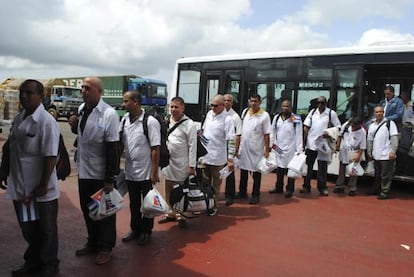Cuban doctors will need permission before they can leave the island
Government sets restrictions on non-business trips abroad amid migratory crisis

On Tuesday, the Cuban government announced a measure that will require medical professionals who want to travel abroad to submit a formal request to the Ministry of Health. The new regulation, which will go into effect on December 7, is a step back in terms of freedom for doctors as the country grapples with an immigration crisis, which has already seen 4,000 doctors who are hoping to eventually travel to the United States end up stranded in Central America.
The Cuban-American organization Solidarity Across Borders estimates that around 5,000 Cuban doctors have deserted over the last decade
The Caribbean country has been taking a carrot and stick approach to health professionals this year. In October, the government made a historic decision to offer amnesty to deserting doctors who settled in the United States under the Bush administration’s Cuban Medical Professional Parole Program, which sought to encourage emigration from the island. After the United States and Cuba launched efforts to reset diplomatic relations, Raúl Castro promised to pardon those who returned home and guaranteed them jobs. But now, in order to avoid a brain drain, the government is introducing this measure, whereby medical professionals will have to seek formal permission from the Ministry of Health before leaving the island.
In a statement published in Cuba’s official newspaper Granma, the government said the new regulations are not travel prohibitions. “Departure dates from the country will be evaluated while taking into account substitutes for every professional” in order to guarantee “quality, continuity, and stability in health services,” the text read. The measure is also meant to “to mitigate the effects” caused by “the United States’ selective and politicized immigration policy toward Cuba” and the “increasing unplanned hiring of Cuban doctors in other countries,” the official statement continued.
The Cuban-American organization Solidarity Across Borders estimates that around 5,000 Cuban doctors have deserted over the last decade, while serving on international missions in various Latin American countries such as Venezuela. They travel illegally throughout Central America and Mexico to make their way to the United States where they can take advantage of the Cuban Adjustment Act, also known as the “wet foot, dry foot” policy. The measure helps Cubans who leave the island apply for residency on American soil. Cuba receives 100,000 barrels of oil a day for the service Cuban doctors provide in Venezuela.
In 2013, the Cuban government allowed medical doctors to travel abroad for personal reasons, just like other citizens, after passing a law that eliminated immigration hurdles that limited freedom of movement for five decades. Since the government lifted these restrictions, almost half-a-million Cubans have traveled to other countries for personal reasons, official records say. This movement represents an 81-percent increase in travel compared to the period between 2010 and 2012. The United States, Mexico, Panama, Spain and Ecuador are the most frequent destinations. On Tuesday, Ecuador reinstated a visa requirement for Cubans. Before, they were allowed a three-month stay without a visa, which they could use to prepare their trip north. But, after a sudden influx of immigrants arrived in November, Nicaragua closed its southern border with Costa Rica, where 4,000 Cubans are waiting to begin their journey to the United States.
English version by Dyane Jean Francois.
Tu suscripción se está usando en otro dispositivo
¿Quieres añadir otro usuario a tu suscripción?
Si continúas leyendo en este dispositivo, no se podrá leer en el otro.
FlechaTu suscripción se está usando en otro dispositivo y solo puedes acceder a EL PAÍS desde un dispositivo a la vez.
Si quieres compartir tu cuenta, cambia tu suscripción a la modalidad Premium, así podrás añadir otro usuario. Cada uno accederá con su propia cuenta de email, lo que os permitirá personalizar vuestra experiencia en EL PAÍS.
¿Tienes una suscripción de empresa? Accede aquí para contratar más cuentas.
En el caso de no saber quién está usando tu cuenta, te recomendamos cambiar tu contraseña aquí.
Si decides continuar compartiendo tu cuenta, este mensaje se mostrará en tu dispositivo y en el de la otra persona que está usando tu cuenta de forma indefinida, afectando a tu experiencia de lectura. Puedes consultar aquí los términos y condiciones de la suscripción digital.









































